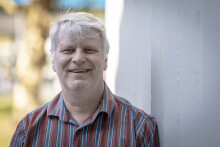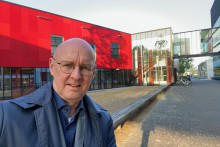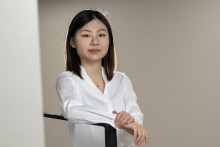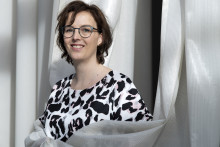ian gibson
Ian Gibson is a renowned expert on additive manufacturing. He worked in the UK, Hong Kong, Singapore, and Australia before moving to Twente last year. He now works as the Scientific Director of the Fraunhofer Project Center based on campus and as Professor of Design Engineering at the University of Twente.
2019 – now Scientific Director of the Fraunhofer Project Center and Professor of Design Engineering at the University of Twente
2013 – 2018 Professor of Additive Manufacturing, Deakin University (Australia)
2005 – 2013 Associate Professor, National University of Singapore
1994 – 2005 Associate Professor of Advanced Manufacturing Technology, University of Hong Kong
1992 – 1995 Robotics and automation lecturer, University of Nottingham, UK
1989 PhD in Robotics, University of Hull
What do you mean by being an academic mercenary?
Gibson: ‘I moved around a lot and experienced a lot of different cultures, strong cultures, at many different universities. Because of that I’ve been a bit of an outsider for most of my career, but I try to spin that and look at it from a positive perspective. This is partly thanks to an advice I got as a young postdoc when my supervisor told me “always give 100% to your employer, never look backwards”. I agree. No matter where you are, you should not doubt the philosophy of the institute you are working for. Sometimes you meet professors who go on about how they used to do things at their previous job and you wonder why they are even there. I prefer not to do that. You can either resist or you can adjust.’
When you say ‘mercenary’, you might also think of a soldier that does anything for money.
‘No, that is not what I meant. Maybe I should have called it “ronin” instead.’
How about the second part of the title? Did you become a professor without even trying?
‘Yes, in a way. What I meant to say is: you shouldn’t make becoming a professor your main objective. You are always trying. You are trying to impact society, to create good research, to help others develop their academic career. But you shouldn’t be trying to become a professor. Instead you should try to be a good person, to be helpful and collegial. I want to focus on my life journey, not necessarily my career. I’m not a famous scientist. It’s about what I’ve done for the community. I’ve done research and I’ve been cited, but the process of becoming a professor was very evolutionary. I wanted to let people know, let them know how I ended up here.’
How about the future? Any plans or ambitions?
‘My field of expertise is 3D printing. What does future hold for 3D printing? In the past, everyone was convinced that it was going to revolutionize manufacturing. Yet reality is not quite so rosy. That is why we should not talk of revolutions. We should take out the “r”. I prefer evolutionary processes. 3D printing should be seen as a tool, a tool to make things lighter, cheaper and more customized. My prediction is that most developments will happen in healthcare, in generating replacement organs for example. And I’m pleased to have been a part of that. So yes, I also think of the future, but… have you heard of the Cassandra effect? Cassandra lived in the mythical Troy and was given a gift of seeing the future. At the same time she was cursed because nobody believed her prophecies. So when I look into the future, I might suffer from the Cassandra effect. No matter what I say, will you believe me? So the future is bright and gloomy at the same time. As usual.’








